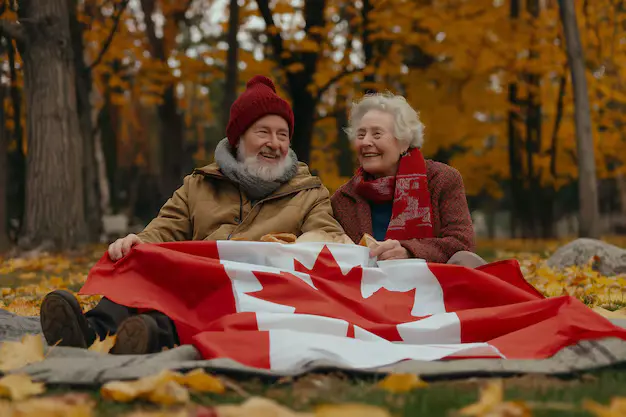Reuniting Families in the Great North

Discover the pathways to family reunification in Canada through sponsorship
On This Page, You Will Find:
- Family Sponsorship: A Pillar of Canadian Immigration
- Understanding Canadian Family Sponsorship
- Step-by-Step Guide to Family Sponsorship
- Sponsoring Spouses and Partners
- Sponsoring Dependent Children
- Sponsoring Parents and Grandparents
- Frequently Asked Questions and Legal Assistance
Canada has long been recognized as a beacon of hope and opportunity for those seeking to build a better life. Among the many pathways to Canadian residency, family sponsorship shines as a vital conduit, allowing families to reunite and thrive on Canadian soil. In this blog post, we delve deeply into the mechanics of sponsoring family members to immigrate to Canada, unraveling the complexities and nuances of the process.
Family Sponsorship: A Pillar of Canadian Immigration
The concept of family reunification holds a revered place in Canada's immigration framework. Since the aftermath of the Second World War, Canada has embarked on a mission to welcome immigrants not merely as economic contributors but as integral members of society, enriching the cultural and social fabric of the nation. The family class is the second largest category of newcomers under Canada’s Immigration Levels Plan, underscoring the nation's commitment to keeping families together.
At the heart of this initiative lies the Department of Immigration, Refugees and Citizenship Canada (IRCC), which orchestrates and regulates the family sponsorship program. Through a meticulous process, the IRCC establishes criteria, reviews applications, and issues permanent and temporary resident visas, ensuring that the process is both rigorous and fair.
Understanding Canadian Family Sponsorship
Family sponsorship is more than just an administrative procedure; it is a profound commitment that carries both privileges and responsibilities. By sponsoring a family member, you enable them to obtain permanent residency (PR) in Canada. However, this privilege comes with a pledge to provide for their basic needs and support them financially, thereby ensuring their successful integration into Canadian society.
Eligibility to Sponsor
Before embarking on this journey, potential sponsors must meet specific criteria. These include being a Canadian citizen or permanent resident, being at least 18 years old, and demonstrating the financial capability to support the sponsored individual. The underlying principle is to ensure that the sponsored family member does not become a burden on Canadian social services.
Who Can Be Sponsored?
The family sponsorship program primarily encompasses spouses, common-law partners, dependent children, and parents or grandparents. However, there are exceptions, allowing for the sponsorship of non-immediate family members such as siblings, nieces, or uncles, under specific circumstances. This flexibility acknowledges the diverse family dynamics and ensures a wider scope for reunification.
Financial Undertakings and Commitments
Sponsorship is a serious financial commitment. Sponsors are required to sign an agreement to provide for the basic needs of their family member. In certain cases, sponsors must meet or exceed the Low Income Cut-off (LICO) to demonstrate their financial readiness to support the sponsored individual without government assistance. This includes situations where the sponsor has dependent children or is sponsoring a parent or grandparent.
In Quebec, additional requirements are imposed, including assisting the sponsored individual in learning French and integrating into the province's unique cultural landscape.
Step-by-Step Guide to Family Sponsorship
Embarking on the sponsorship process involves several key steps:
-
Eligibility Assessment: The first step is ensuring that both the sponsor and the individual being sponsored meet the eligibility criteria set forth by the IRCC.
-
Application Submission: Applications must be submitted both at the federal level and, for Quebec residents, at the provincial level. This dual application process ensures that all legal and bureaucratic requirements are met.
-
Payment of Fees: Sponsorship applications are subject to a fee, which must be paid at the time of submission.
-
Proper Documentation: Ensuring that all forms and documents are correctly filled out and submitted to the appropriate address is crucial for the timely processing of the application.
Sponsoring Spouses and Partners
The sponsorship of a spouse or partner is a deeply personal and significant endeavor. Whether legally married or in a common-law relationship, sponsors must demonstrate the authenticity of their relationship. The process can be undertaken via two primary streams: Inland and Outland sponsorship.
Inland Sponsorship
Inland sponsorship pertains to situations where the spouse or partner is already residing in Canada. This pathway allows the sponsored individual to apply for an open work permit, facilitating their integration into Canadian society as their application is processed.
Outland Sponsorship
Outland sponsorship is applicable when the sponsored individual resides outside of Canada. While they typically await permanent residency in their home country, they may visit Canada during this period.
Sponsoring Dependent Children
Sponsoring dependent children ensures that families can remain together and flourish in their new Canadian home. Whether natural or adopted, children must meet specific criteria to qualify as dependents. This includes being unmarried and under the age limit defined by Canadian immigration laws.
Sponsoring Parents and Grandparents
The Parents and Grandparents Program (PGP) allows Canadian citizens and permanent residents to bring their parents and grandparents to Canada. This initiative reflects Canada’s recognition of the invaluable role that older generations play in the family unit. However, due to high demand, the application process for this program is competitive and subject to specific quotas each year.
Frequently Asked Questions and Legal Assistance
Navigating the intricacies of family sponsorship can be daunting. Many prospective sponsors find themselves grappling with questions about eligibility, documentation, and timelines. Seeking guidance from experienced immigration lawyers can provide clarity and ensure that applications are handled with precision and care.
Conclusion
Family sponsorship is a testament to Canada’s commitment to family values and cultural diversity. By understanding the requirements and processes involved, prospective sponsors can successfully reunite with their loved ones, fostering a vibrant and inclusive Canadian society. Whether you’re just beginning the journey or are actively preparing your application, remember that this process is more than a bureaucratic endeavor—it’s a pathway to building a life enriched by family and community.
